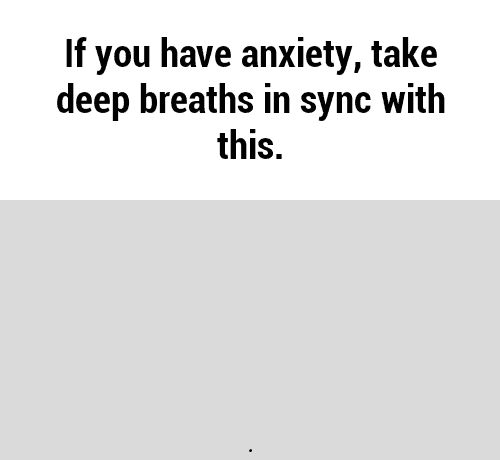This is the most necessary shape on the internet. Breathe in, breathe out. Via GIPHY.
Hello, friends!
I didn't save my last draft before it vanished into the internet abyss. I'm sitting here wondering what do I know well enough that I can type in under an hour and other folks may need help with?
WELP, I know what post-rape trauma is like! -_-
After seven years of experiencing it, I also know what statements have flown out of my mouth the most.
I can't speak for everyone. But if a friend, family member, classmate, or anyone else is confiding in you about their sexual violence story, here are four words and phrases that may come up often. Since I'm not a therapist, I here's all I can prescribe:
Listen deeply + respect their need for space!
Guilt
After a traumatic event, your mind associates typically mundane items with terror and fear.
Even a particular smell (like cigarette smoke or coffee) can send a survivor into panic mode. Lacking an immediate source to help them make sense of these changes, the survivor blames themselves for their current state.
"If I didn't do [insert misplaced blame], I wouldn't have these problems; I'd be ok. Why did I do this to myself?"
Bar none, therapy has become my only solution for releasing self-blame. Working with my therapist has flipped my mindset; I no longer feel weakened by the aftermath of my rape, but stronger and more adept at managing the anxiety and PTSD.
"I don't recognize myself."
A jolting loss of control may create a disconnect in a sexual violence survivor.
Looking in the mirror after being raped, sexually assaulted, or sexually abused can feel like standing in front of another person's image and expecting to see yourself.
"Who is this person? This isn't me or what my life was like. I want things to go back to how they were."
A survivor's life will never be what it was pre-trauma. And that is to say survivors will see the world on a more vigilant plane, which can then turn into hypervigilance.
Survivors may have had prior mental health concerns that were exacerbated by their trauma. They may face health-related issues brought on by their perpetrator(s). Someone who's known for their physical strength must cope with the effects of losing touch with their usual defense.
Survivors are faced with getting to know a new version of their former selves.
I had anxiety prior to my rape, but it took years to realize the small, post-trauma nuances that were affecting my day-to-day. Upon starting therapy, I started seeing patterns. I noticed when where and why I felt uneasy and what reaction(s) would arise. I began to note how often my flashbacks would come into play. Thankfully, they are much more under control in the present.
Today, I understand that managing these changes is 100% within reach for me. My regression about the past has given me the courage to help other survivors.
Wish
Regression and shame are some common, immediate reactions to sexual violence.
"I wish this didn't happen to me ... I wish someone else could understand how I'm feeling ... Did i cause this? ... I wish someone could've done something. I wish i could've done something."
Flashbacks would ignite my backtracking. And not coming forward has, in the past, triggered my shame. I've tried yoga and meditation. When not focusing on the next asana, I replayed my personal limitations and the postures that triggered negative memories.
Now that I'm in therapy, practicing yoga has become more useful. Many folks, from war veterans to incarcerated peoples, find trauma yoga to be of powerful relief, since it offers a sense of control over how you want your body to be. Trauma yoga relinquishes the teacher's authority and hands it over to the student. Some folks find this style to be too loose, while others find strength in the individualism.
"I don't know."
I don't have hypothetical quotes for this one!
It's difficult for sexual violence survivors to clearly express how their trauma(s) are affecting them. Some folks become angry (with other people or themselves); some survivors isolate themselves in fear or due to a lack of feeling understood; some folks lose trust in everyone while others begin to over-trust.
I excelled in school, making the Dean's List the semester after my rape. I went to parties like any other freshman. I was romantically involved about a year afterward.
Beyond the outer goods, all the fugly stuff remained trapped inside.
I didn't know how to talk about what happened let alone how I was feeling.
Thankfully, I've had some incredible support over the years, including a few professors (props to Women and Gender Studies profs always holding space for me and my tears!!!). I always knew, even while speechless, that I wanted to be an advocate for rape and sexual assault survival. Since starting therapy, I've thrown mental health into the roundup! Learning to walk through my trauma has given me all the words I've needed. Maya Angelou said it even better. That link is a must watch.
If you need someone to talk to, more resources, or a place to feel safe, here are a few links (LGBTQ-friendly spaces are marked with an asterisks.)
RAINN * (separate link from the 1st)
FORGE *
The National Domestic Violence Hotline
While you're around, read my previous blog about passion and click this to talk to me. And here's another writer who loves mental health stuffs!
Comment below and catch up with my Instagram!!

